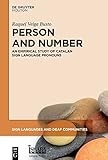Person and Number : An Empirical Study of Catalan Sign Language Pronouns / Raquel Veiga Busto.
Material type: TextSeries: Sign Languages and Deaf Communities [SLDC] ; 18Publisher: Berlin ; Boston : De Gruyter Mouton, [2023]Copyright date: ©2023Description: 1 online resource (XXI, 235 p.)Content type:
TextSeries: Sign Languages and Deaf Communities [SLDC] ; 18Publisher: Berlin ; Boston : De Gruyter Mouton, [2023]Copyright date: ©2023Description: 1 online resource (XXI, 235 p.)Content type: - 9783110999662
- 9783110989199
- 9783110988956
- 419/.467 23
- online - DeGruyter
- Issued also in print.
| Item type | Current library | Call number | URL | Status | Notes | Barcode | |
|---|---|---|---|---|---|---|---|
 eBook
eBook
|
Biblioteca "Angelicum" Pont. Univ. S.Tommaso d'Aquino Nuvola online | online - DeGruyter (Browse shelf(Opens below)) | Online access | Not for loan (Accesso limitato) | Accesso per gli utenti autorizzati / Access for authorized users | (dgr)9783110988956 |
Frontmatter -- Contents -- Acknowledgments -- List of Figures -- List of Tables -- Notational conventions -- Sign language acronyms -- 1 Introduction -- Part I: Person -- Introduction -- 2 The person category -- 3 Person in LSC personal pronouns -- 4 Featural analysis of person markers -- Part II: Number -- Introduction -- 5 The number category -- 6 Number in LSC nouns and pronouns -- 7 Restricted groups -- 8 Number (and person) distinctions in LSC -- 9 Closing remarks -- Bibliography -- Index
restricted access online access with authorization star
http://purl.org/coar/access_right/c_16ec
Person and number are two basic grammatical categories. However, they have not yet been exhaustively documented in many sign languages. This volume presents a thorough description of the form and interpretation of person and number in Catalan Sign Language (LSC) personal pronouns. This is the first book exploring together the two categories (and their interaction) in a sign language.Building on a combination of elicitation methods and corpus data analysis, this book shows that person and number are encoded through a set of distinctive phonological features: person is formally marked through spatial features, and number by the path specifications of the sign. Additionally, this study provides evidence that the same number marker might have a different semantic import depending on the person features with which it is combined.Results of this investigation contribute fresh data to cross-linguistic studies on person and number, which are largely based on evidence from spoken language only. Furthermore, while this research identifies a number of significant differences with respect to prior descriptions of person and number in other sign languages, it also demonstrates that, from a typological standpoint, the array of distinctions that LSC draws within each category is not exceptional.
Issued also in print.
Mode of access: Internet via World Wide Web.
In English.
Description based on online resource; title from PDF title page (publisher's Web site, viewed 25. Jun 2024)


